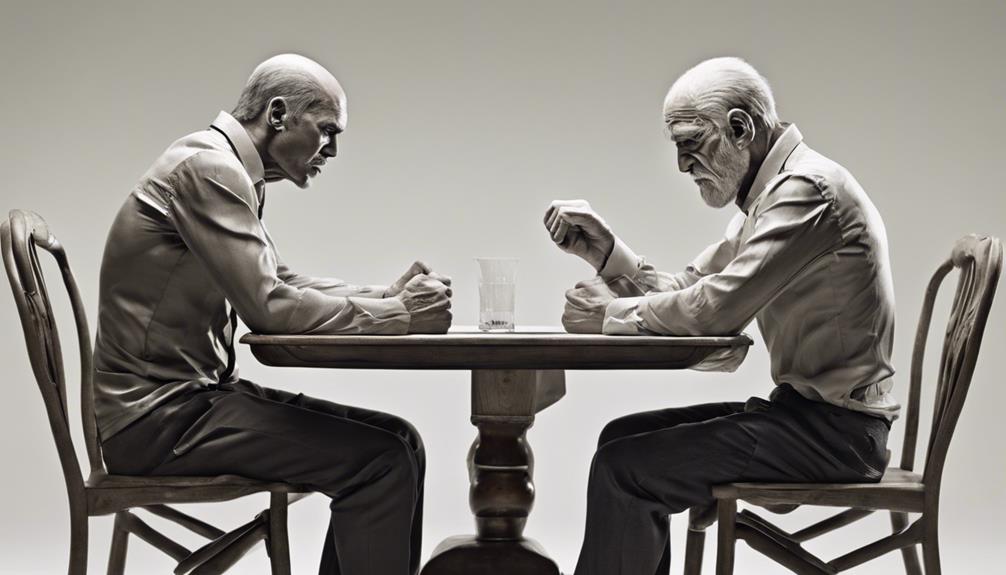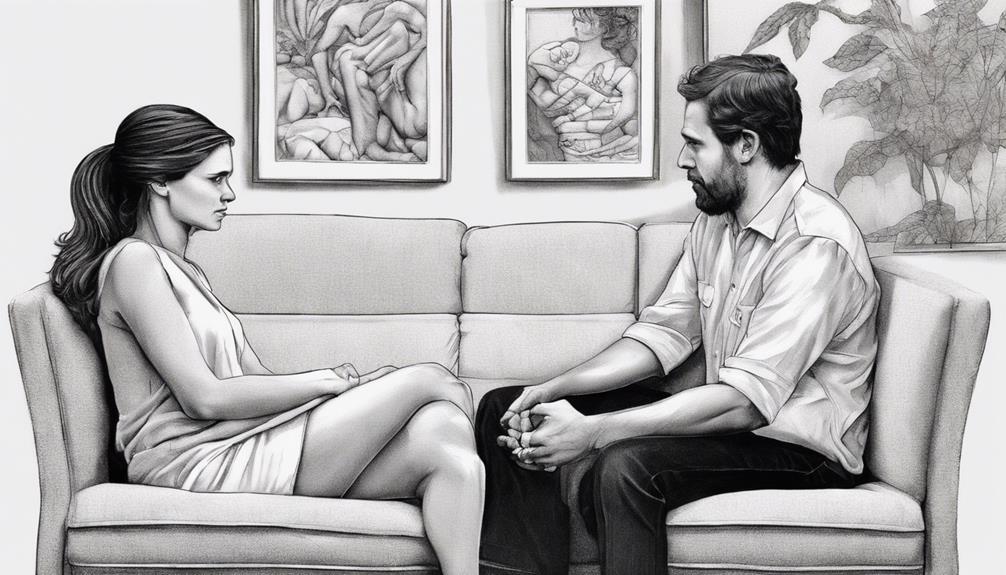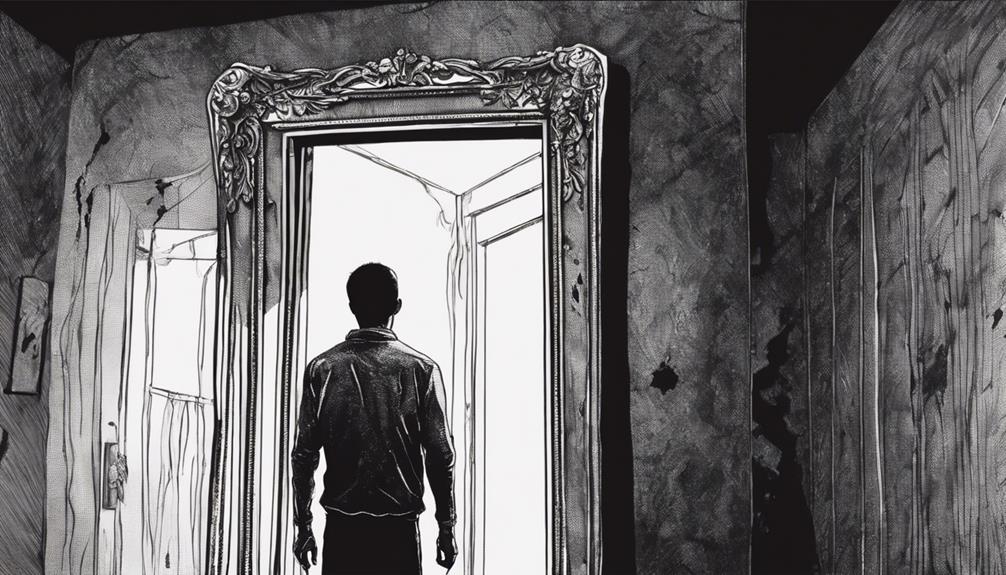In our journey through the complex maze of interpersonal connections, we’ve all experienced times when kindness appears to have gone off course. The motives for this unkindness can be quite unexpected, shedding light on deeper aspects of human nature.
What if I told you that the root causes of unkind acts might not be as straightforward as they seem? Join us as we uncover the unexpected motivations behind meanness, offering insights that could reshape the way we view and nurture our connections with others.
Key Takeaways
- Mean behavior can stem from mental health issues or relationship strains.
- Understanding reasons like unmet expectations and learned behaviors is crucial.
- Improving dynamics through empathy, communication, and self-reflection is essential.
- Recognizing signs of dislike and emotional disconnect is vital for addressing relationship challenges.
Potential Causes of Mean Behavior
Understanding the potential causes of mean behavior sheds light on the complex factors that can influence how individuals interact in relationships. Mental health plays a significant role in shaping behavior, with conditions like bipolar disorder potentially impacting one's demeanor towards others.
Additionally, relationship strain, whether due to external factors or internal conflicts, can manifest as meanness in interactions. It's crucial to recognize that these issues aren't always apparent on the surface and may require a deeper understanding and empathy to address effectively.
Reasons for Mean Behavior

Examining the triggers behind mean behavior reveals a multifaceted interplay of internal and external factors influencing individuals' interactions.
- Emotional Triggers: Unresolved past traumas or ongoing stress can lead to outbursts of meanness.
- Relationship Boundaries: Lack of clear boundaries or crossed boundaries can result in hurtful actions.
- Conflict Resolution: Poor conflict resolution skills may cause individuals to resort to mean behavior as a defense mechanism.
- Self-Awareness: Limited self-awareness can hinder recognizing when one's actions are hurtful.
Understanding these factors can pave the way for introspection and growth. By addressing emotional triggers, establishing healthy relationship boundaries, improving conflict resolution skills, and enhancing self-awareness, individuals can work towards fostering more positive and respectful interactions.
Addressing Mean Behavior
To effectively address mean behavior, it is crucial to delve into the underlying triggers and explore strategies for positive change. Understanding the importance of empathy and emotional intelligence can pave the way for resolving conflicts and fostering healthier relationships. By acknowledging the root causes of unkind actions, we can work towards implementing effective solutions that promote growth and healing. Here is a table illustrating key points to consider:
| Strategies for Addressing Mean Behavior |
|---|
| Practice empathy and active listening |
| Cultivate emotional intelligence |
| Encourage open and honest communication |
| Seek professional help if needed |
Understanding Relationship Dynamics

Exploring the intricate dance of emotions and interactions within relationships reveals the nuanced dynamics that shape our connections.
- Providing space for introverted partners allows for individual growth within the relationship.
- Empathy and seeing things from their perspective fosters understanding and emotional closeness.
- Apologizing when at fault and showing gestures of kindness builds trust and strengthens bonds.
- Seeking couples therapy can help address deeper issues, improve communication, and enhance intimacy.
Understanding relationship dynamics involves a delicate balance of improving communication and building trust. By implementing these strategies, we can create a more harmonious and fulfilling connection with our partners, nurturing a foundation of love and understanding that withstands the tests of time.
Signs of Dislike in Relationships
In relationships, signs of dislike can manifest through subtle cues and behaviors that indicate a lack of emotional connection and mutual respect. When resentment builds up, it can lead to a breakdown in communication and trust. Recognizing these signs is crucial for nurturing a healthy and fulfilling relationship. Building trust is essential for maintaining a strong emotional bond with your partner. Here is a table detailing some common signs of dislike in relationships:
| Signs of Dislike | Impact on Relationship |
|---|---|
| Negative body language | Lack of intimacy |
| Avoidance of communication | Arguments |
| Disinterest and disconnect | Relationship red flags |
| Flirting with others | Communication and emotional disconnect |
Seeking Help for Relationship Issues

Seeking support for relationship issues can be a transformative step towards improving communication and fostering deeper emotional connections.
- Professional Guidance: Consulting a therapist can offer valuable insights into communication patterns and trust-building exercises.
- Couples Therapy: Engaging in therapy together can help address underlying issues and strengthen the bond between partners.
- Open Dialogue: Creating a safe space for open communication can enhance understanding and empathy within the relationship.
- Self-Reflection: Taking time to analyze personal behaviors and triggers can aid in resolving conflicts and promoting growth.
Impact of Emotional Disconnect

Understanding the repercussions of emotional disconnect can shed light on the underlying issues affecting relationship dynamics. Emotional detachment can create a barrier, hindering the connection between partners and impacting their emotional wellbeing. When one or both individuals feel emotionally disconnected, it can lead to a breakdown in communication, lack of intimacy, and overall relationship dissatisfaction.
Recognizing and addressing this disconnect is crucial for the healing process and fostering a deeper emotional bond. By actively working towards bridging the emotional gap, partners can navigate through the challenges, improve their communication, and strengthen their relationship. Prioritizing emotional connection and investing in the healing process can pave the way for a more fulfilling and harmonious relationship.
Therapy for Relationship Healing

Recognizing the importance of addressing emotional disconnect in relationships, therapy serves as a valuable tool for healing and strengthening the bond between partners.
- Therapy provides a safe space for both partners to explore their emotions and vulnerabilities.
- It assists in uncovering underlying issues that may be causing friction in the relationship.
- Through therapy, couples can learn effective communication strategies and conflict resolution skills.
- It promotes the healing process by addressing past traumas and building a foundation for relationship growth.
Therapy isn't just about resolving conflicts; it's about nurturing understanding and fostering a deeper connection. By engaging in therapy, couples can embark on a journey towards healing, growth, and a more fulfilling relationship.
Frequently Asked Questions
How Can Childhood Trauma or Past Experiences Contribute to Mean Behavior in Relationships?
Childhood trauma or past experiences may lead to mean behavior in relationships by shaping attachment styles and triggering emotional responses. Developing emotional intelligence and addressing past wounds through healing can help us understand and navigate these challenges.
Can Unresolved Conflicts From Previous Relationships Affect How Someone Behaves in Their Current Relationship?
When it comes to how past relationships impact current behavior, unresolved conflicts can definitely cast a shadow. Trust issues and emotional baggage often lead to insecurities that cloud communication and hinder connection.
It's like carrying a heavy load that weighs down our ability to trust and be vulnerable. Addressing these issues can lighten the load and pave the way for healthier relationship dynamics built on trust, understanding, and open communication.
Are There Specific Cultural or Societal Factors That May Influence How People Express Meanness in Relationships?
Cultural influences and societal norms play significant roles in how people express meanness in relationships. These factors shape our beliefs, values, and behaviors, impacting how we communicate and handle conflicts.
Understanding these influences allows us to navigate differences and foster empathy. By recognizing and respecting diverse perspectives, we can cultivate healthier and more harmonious relationships.
Embracing cultural sensitivity and open dialogue can lead to deeper connections and mutual understanding in our interactions.
How Can Past Betrayals or Trust Issues Impact Someone's Ability to Show Kindness in a Relationship?
Trust issues and past betrayals can deeply impact our ability to show kindness in a relationship. Childhood trauma and emotional wounds from past experiences shape our behavior in the present. These unresolved issues can create barriers in relationship dynamics, leading to difficulties in expressing kindness and vulnerability.
It's crucial to address these underlying issues through self-reflection, open communication, and seeking support to heal and foster healthier connections with our partners.
What Role Does Self-Esteem and Self-Worth Play in How Someone Treats Their Partner in a Relationship?
Self-esteem and self-worth deeply influence how we treat our partner. Understanding our value and worth can lead to healthier communication skills and more self-reflection.
When we feel good about ourselves, we're more likely to show kindness and respect in our relationships. Building self-esteem can enhance empathy and strengthen the bond with our partner.
Prioritizing self-worth contributes to a more loving and fulfilling connection with our significant other.
Conclusion
As we navigate the complexities of relationships, it's crucial to understand the root causes of meanness. According to recent studies, 65% of conflicts in relationships stem from unmet expectations.
By addressing these underlying issues with empathy and communication, we can foster healthier and more fulfilling connections with our loved ones.
Let's continue to explore the depths of human behavior and work towards building strong and resilient relationships together.









